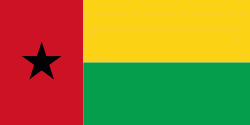Bubaque Airport (Bubaque Airport)
Bubaque Airport is an airport serving the island town of Bubaque, in Guinea-Bissau. It is the Bijagos Archipelago's only airfield.
The airport is on the north end of the island. North approach and departure will be over the water. The 1.2 km runway is unpaved.
The Bissau VOR-DME (Ident: BIS) is located on the Osvaldo Vieira International Airport at Bissau, 40 nmi north-northeast of Bubaque.
* Transport in Guinea-Bissau
* List of airports in Guinea-Bissau
The airport is on the north end of the island. North approach and departure will be over the water. The 1.2 km runway is unpaved.
The Bissau VOR-DME (Ident: BIS) is located on the Osvaldo Vieira International Airport at Bissau, 40 nmi north-northeast of Bubaque.
* Transport in Guinea-Bissau
* List of airports in Guinea-Bissau
| IATA Code | BQE | ICAO Code | GGBU | FAA Code | |
|---|---|---|---|---|---|
| Telephone | Fax | ||||
| Home page |
Map - Bubaque Airport (Bubaque Airport)
Map
Country - Guinea-Bissau
 |
 |
| Flag of Guinea-Bissau | |
Guinea-Bissau was once part of the kingdom of Kaabu, as well as part of the Mali Empire. Parts of this kingdom persisted until the 18th century, while a few others were under some rule by the Portuguese Empire since the 16th century. In the 19th century, it was colonised as Portuguese Guinea. Portuguese control was restricted and weak until the early 20th century with the pacification campaigns, these campaigns solidified Portuguese sovereignty in the area. The final Portuguese victory over the remaining bastion of mainland resistance, the Papel ruled Kingdom of Bissau in 1915 by the Portuguese military office Teixeira Pinto, and recruited Wolof mercenary Abdul Injai was the event to solidify mainland control. The Bissagos, islands off the coast of Guinea-Bissau, were officially conquered in 1936, ensuring Portuguese control of both the mainland and islands of the region. Upon independence, declared in 1973 and recognised in 1974, the name of its capital, Bissau, was added to the country's name to prevent confusion with Guinea (formerly French Guinea). Guinea-Bissau has a history of political instability since independence, and only one elected president (José Mário Vaz) has successfully served a full five-year term. The current president is Umaro Sissoco Embaló, who was elected on 29 December 2019.
Currency / Language
| ISO | Currency | Symbol | Significant figures |
|---|---|---|---|
| XOF | West African CFA franc | Fr | 0 |
| ISO | Language |
|---|---|
| PT | Portuguese language |















